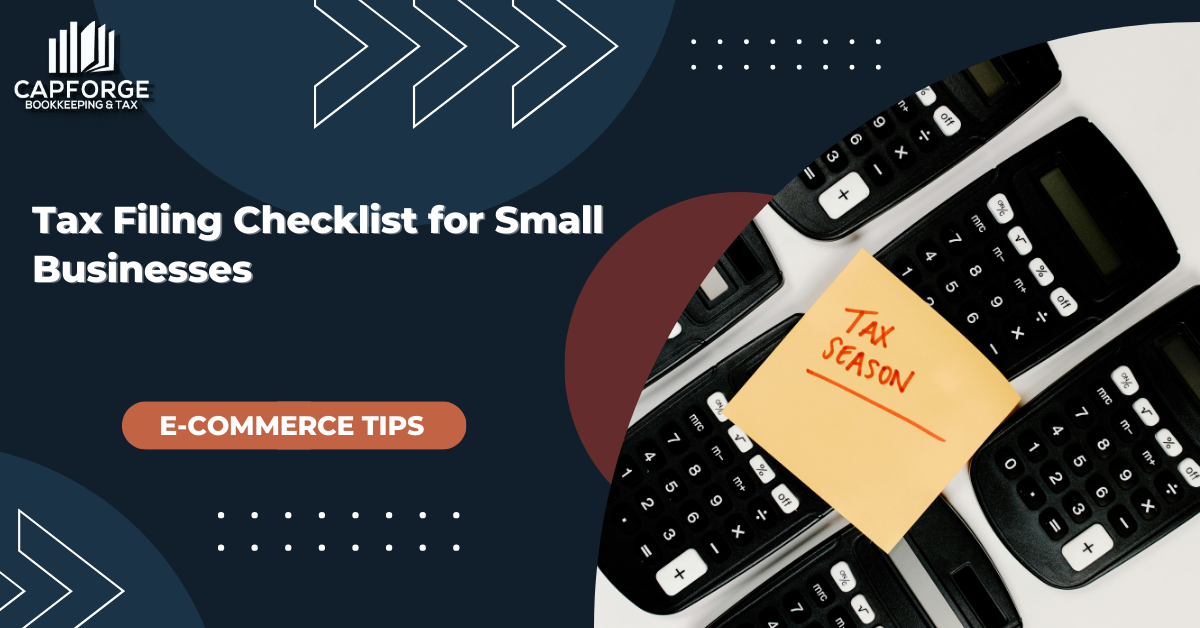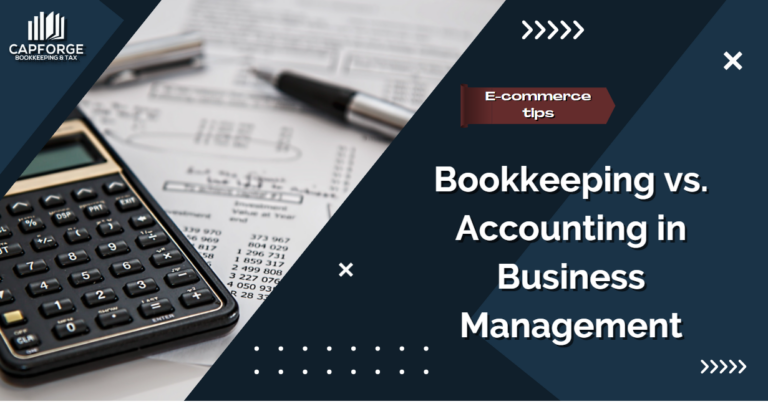Tax Filing Checklist for Small Businesses
Tax season isn’t the most exciting time for any business owner. Between managing day-to-day operations and keeping up with growth, tax filing can easily fall by the wayside.
But, there is zero reason to be underprepared when facing tax responsibilities This is where a well-organized checklist comes in. Having a clear roadmap gives you all the necessary documentation and information readily available, saving you time and stress come filing time.
This checklist will guide you through the essential steps to a smooth tax filing process for your small business.
Prepare the tax filing documentation
Proactive document gathering is essential for a smooth and accurate tax filing process. Waiting until close to the deadline to collect your W-2s, 1099s, receipts, and other relevant documents can lead to unnecessary stress and potential errors.
To avoid such headaches, you must prepare the necessary documentation beforehand. These documents include:
- Business bank statements and credit card statements: Consider these the backbone of your financial records. They provide a chronological record of all your business income (deposits) and expenses (withdrawals) throughout the year. Regularly reconcile your statements to your internal accounting records to ensure accuracy. This helps identify any discrepancies and prevents errors when filing your tax return.
- Income records (sales receipts, invoices, 1099s received): Meticulously document all income your business generated, including sales from products or services, interest earned on business accounts, and any 1099s you receive from vendors who paid you over a certain threshold. These documents verify your income and ensure you’re reporting the correct amount on your tax return.
- Expense receipts (rent, utilities, office supplies, travel): Don’t underestimate the importance of holding onto receipts for all your legitimate business expenses. Categorize them properly (rent, marketing, travel, etc.) to maximize potential deductions. These receipts act as evidence for the Internal Revenue Service (IRS) and support the deductions you claim on your tax return.
- Payroll records (employee W-2s, payroll tax forms): If you have employees, you’ll need to gather their W-2s, which summarize their wages and taxes withheld throughout the year. These are used to report employee income and ensure you’ve paid the appropriate payroll taxes. Additionally, keep copies of any payroll tax forms you filed throughout the year, such as federal and state income tax withholding or Social Security and Medicare taxes.
- Vehicle mileage logs (if claiming mileage deduction): If you use your personal vehicle for business purposes, detailed mileage logs are crucial for claiming the mileage deduction on your tax return. These logs should document the date, destination, purpose of each trip, and the total miles driven. The more meticulous your records, the stronger your case for the deduction.
- Asset depreciation schedules: If you purchased business assets (equipment, furniture, computers, etc.) with a useful life exceeding one year, create depreciation schedules. These schedules allow you to deduct a portion of the asset’s cost each year over its useful life, reducing your taxable income. The IRS provides specific guidelines for depreciation methods and useful lives of different asset categories.
Identify your tax filing requirements
Once you have the necessary documentation, the next step is to figure out your tax filing requirements. The tax filing requirements for your business depend heavily on the structure you choose. Here’s a quick breakdown:
1. Sole Proprietorship & Partnership
These are considered “pass-through entities.” Business income (profit) or loss “passes through” to the owner(s)’ personal tax returns, reported on Schedule C (sole proprietorship) or Schedule K-1 (partnership) respectively. The business itself doesn’t pay income tax, but the owner(s) pay taxes on the business income on their personal tax returns.
2. S Corporation
Similar to pass-through entities, S corporations file a separate informational tax return (Form 1120S) but avoid double taxation. The corporation’s profits or losses pass through to the shareholders’ personal tax returns, who are then taxed on their share of the income. There are specific eligibility requirements and filing deadlines to maintain S corporation status.
3. C Corporation
C corporations are separate legal entities from their owners (shareholders). They file their own corporate tax return (Form 1120) and pay taxes on their profits. If profits are then distributed to shareholders as dividends, those dividends are taxed again as personal income. This is known as double taxation.
Choosing the right tax form based on your business structure is crucial as it ensures you comply with filing requirements and avoid penalties. Consulting with a tax advisor can help you determine the most suitable structure and tax filing strategy for your specific business.
Tax filing options: DIY vs. professional
Deciding whether to tackle your small business taxes yourself or enlist a professional accountant depends on several factors. Here’s a breakdown of the pros and cons of each approach:
DIY Tax Filing Pros: Cost-Effectiveness
The clear advantage of filing your own taxes is the cost savings. Tax preparation software or online filing services can be significantly cheaper than hiring an accountant. Additionally, there’s a sense of accomplishment that comes from managing your own finances. Understanding your tax situation can also give you valuable insights into your business performance.
However, filing yourself also comes with drawbacks.
DIY Tax Filing Cons: Complexity and Potential Errors
Tax codes can be intricate and constantly evolving. If your business has multiple income streams, inventory, employees, or complex deductions, navigating the system on your own can be overwhelming. Mistakes on your return can lead to delays, penalties, or even audits.
Without a professional’s expertise, you might miss out on claiming all the deductions and credits you’re entitled to. Additionally, tax preparation can be a time-consuming process, requiring significant effort to gather documents, understand forms, and ensure accuracy.
Outsourced Tax Filing Pros: Expertise
A qualified accountant stays up-to-date on tax laws and can ensure your return is filed accurately and efficiently. They can also identify potential tax-saving opportunities you might overlook. This translates to peace of mind, knowing a professional is handling your taxes and freeing up your time to focus on running your business.
In the unfortunate event of an audit, your accountant can represent you before the IRS and help navigate the process.
Outsoured Tax Filing Cons: Cost and Reliance
The main drawback of hiring a professional is the cost. The fee can vary depending on the complexity of your business and the accountant’s experience. Additionally, you’ll be entrusting your financial information to a third party. Choosing a reputable and qualified accountant is essential to ensure a seamless tax filing process.
Benefits of outsourcing tax filing to a professional
While a DIY route may seem like a good idea for small business owners, the most sensible option is to outsource your tax filing to a seasoned tax professional. Here’s a closer look at some of the key benefits:
- Accuracy and Error Avoidance: Tax codes are intricate, with new regulations and updates happening regularly. A tax professional stays current on these changes and can meticulously prepare your return to minimize the risk of errors that could trigger penalties or delays from the IRS.
- Maximizing Deductions and Credits: Beyond simply filing your tax return, a skilled tax professional can act as a financial strategist. They’ll delve into your specific tax situation to identify all the deductions and credits you qualify for, potentially saving you significant amounts of money. Some deductions and credits might be obscure or have eligibility requirements you wouldn’t be aware of on your own.
- Peace of Mind and Reduced Stress: Tax season can be a very stressful time. A tax professional takes the burden off your shoulders by handling the entire filing process, from gathering documents to ensuring everything is submitted correctly and on time. This allows you to focus on your work or personal life with peace of mind.
- Audit Representation: While most tax returns are processed smoothly, there’s always a chance of an audit. If you face an audit, a tax professional with expertise and experience can represent you before the IRS, ensuring a smooth resolution and protecting your interests.
- Year-Round Tax Planning: A tax professional’s services aren’t limited to just tax season. They can provide ongoing guidance throughout the year on tax-related matters, helping you make informed financial decisions that can benefit you come filing time.
Conclusion
Filing taxes as a small business owner doesn’t have to be a stressful scramble. By utilizing a tax filing checklist and staying organized throughout the year, you can face tax season with confidence. Remember, a well-maintained checklist not only saves time and reduces errors but also ensures you claim all the deductions and credits you deserve.
For an extra layer of efficiency and peace of mind, our team at CapForge is here to help. With seasoned tax experts filing your business taxes, you can feel confident in fulfilling your tax obligations with ease. For more information about our services, feel free to fill out the form below.







